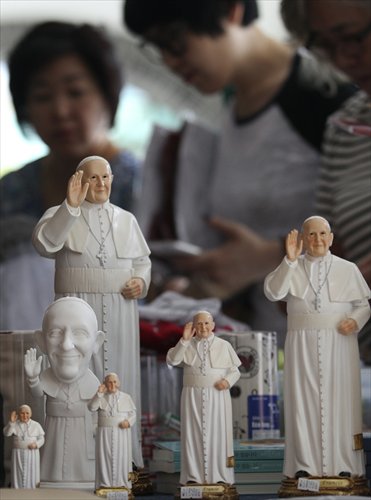HOME >> CHINA
Pope's approved China fly-by seen as sign of 'possible détente'
By Hu Qingyun and Jiang Jie Source:Global Times Published: 2014-8-14 0:38:01
Right to appoint bishops, Taiwan question remain obstacles to ties

Statues of Pope Francis are displayed in a souvenir shop at Myeongdong Cathedral in Seoul on Wednesday. Pope Francis is scheduled to make a trip to South Korea, starting Thursday to participate in a Catholic youth festival and to preside over a beatification ceremony for 124 Korean martyrs. Photo: AP
Relations between China and the Vatican may see an upswing after Beijing gave permission for Pope Francis to use Chinese airspace as he flies to South Korea Thursday ahead of a six-day visit, said religious affairs experts.There may be a rare chance to engage Chinese President Xi Jinping, as the Pope always sends greetings to state leaders via telegram when he passes through their airspace, according to Vatican protocol.
This routine rarely makes headlines, but the Pope's messages this time attracted great attention as he will communicate with China, which severed diplomatic relationship with the Vatican in the 1950s.
Beijing refused to allow then Pope John Paul II to cross Chinese airspace when he was on the way to South Korea in 1989 due to the tension. As a result, observers see this papal fly-by as a small step forward in improving relations between the Vatican and China.
Wang Meixiu, a research fellow with the Institute of World Religion Studies at the Chinese Academy of Social Sciences, told the Global Times that to allow the papal fly-by shows the Chinese government's courtesy and is a sign of possible détente.
"The lack of communication and understanding between the two sides hinders the development of relations. This fly-by shows Chinese government may hope to resolve their issues."
Wang noted that the main obstacle between the two countries is that the Vatican does not recognize the authority of the Chinese Patriotic Catholic Association and the bishops it appoints.
However, Wang said that there may still be an impasse as the Vatican will not give up its right to appoint bishops in China.
"There is still a way out, if the Vatican can reach an agreement with Chinese authorities over the candidates for bishops," Wang said.
Whether Xi will respond to the Pope's telegram and if so, what kind of message he will convey remains unknown.
Wang noted that the possible response may be a courtesy rather than anything tangible.
A Catholic worshipper in Shanghai, who asked to remain anonymous, told the Global Times that he felt it was progress that the Pope is allowed to fly over China.
Pope Francis is the first Pope to disclose that he received a reply from a Chinese leader to whom he wrote letters, reported Italian newspaper Corriere Della Sera. The Pope said he exchanged letters with Xi in March 2013.
Yang Fenggang, a religious studies professor at Purdue University in Indiana, told the Global Times that both China and the Vatican have changed greatly over the years, in spite of the conflicts in the 1950s between China and the Vatican.
"Coming from a developing country, Pope Francis has won great popularity across the world. He is also known for promoting reform and anti-corruption inside the church," Yang noted.
Improving relations would benefit both sides, Wang said, adding that underground churches and the lack of authority of some bishops have become a problem which can impact the stability of Chinese society.
China's authorities cannot solve the problems without the Vatican's involvement, she said.
Some Chinese Catholics intend to go to South Korea for an opportunity to meet the Pope, although there are no organized tours by local churches.
"One of my Catholic friends has already arrived in South Korea. Some priests may have organized believers to travel together privately," the anonymous Shanghai-based Catholic said.
One Chinese Catholic priest, who goes by the name of Paul, told the Global Times that believers are supposed to go to South Korea according to religious tradition, but many were hindered in reality. "There was a notice that recommended people not to go to South Korea, which is understandable given the current diplomatic conditions between China and the Vatican," said Paul.
He said that there were no organized trips to South Korea and his church had seen no evidence of individuals making the trip so far.
Reuters contributed to this story
Posted in: Politics